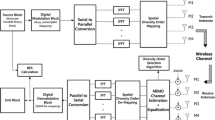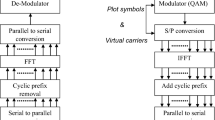Abstract
Performance evaluation of enhanced link adaptation method for MIMO-OFDM systems with limited feedback using measurement based channels and a stochastic channel model is presented in this paper. In particular, impact of practical channel estimation and feedback errors on link performance is analyzed. An adaptive spatial and modulation scheme selection process is based on the effective signal-to-interference-plus-noise ratio (ESINR). Mutual information effective SINR mapping method is applied for calculating ESINR values due to its capability of accurate estimation of the error rate performance of large variety of MIMO channels. Numerical results show that simple adaptive systems that switch between diversity/multiplexing or beamforming/multiplexing schemes obtain relatively good performance in realistic 2 × 2 MIMO channels. It is also shown that the imperfect channel estimation and feedback errors can have significant impact on the link performance. Furthermore, it is noticed that using the stochastic channel model in performance simulations can give rather pessimistic results compared to true measurement data.









Similar content being viewed by others
References
S. Zhou and G. Giannakis, Optimal transmitter eigen-beamforming and space-time block coding based on channel mean feedback. IEEE Transactions on Signal Processing, Vol. 50, No. 10, pp. 2599–2613, 2002.
S. Zhou and G. B. Giannakis, Optimal transmitter eigen-beamforming and space-time block coding based on channel correlations. IEEE Transactions on Information Theory, Vol. 49, No. 7, pp. 1673–1690, 2003.
H. Sampath and A. J. Paulraj, Linear precoding for space-time coded systems with known fading correlations. IEEE Communications Letters, Vol. 6, No. 6, pp. 239–241, 2002.
D. J. Love and R. W. Heath, Limited feedback diversity techniques for correlated channels. IEEE Transactions on Vehicular Technology, Vol. 55, No. 2, pp. 718–722, 2006.
D. Love and R. W. Heath, Limited feedback unitary precoding for spatial multiplexing systems. IEEE Transactions on Information Theory, Vol. 51, No. 8, pp. 2967–2976, 2005.
A. Forenza, A. Pandharipande, H. Kim, and R. W. Heath, Adaptive mimo transmission scheme: exploiting the spatial selectivity of wireless channels. In Proceedings of the IEEE Vehicular Technology Conference, Vol. 5, pp. 3188–3192, 2005.
IEEE, IEEE Standard for Local and Metropolitan Area Networks—Part 16: Air Interface for Fixed and Mobile Broadband Wireless Access Systems, 2006.
3GPP, 3GPP TS 36.300, Technical Specification Group Radio Access Network, E-UTRA and E-UTRAN, Overall description , V8.8.0 (2009-04-03), 3GPP, Tech. Rep., 2009.
WINNER+, D1.4 Initial Report on Advanced Multiple Antenna Systems, CELTIC/CP5-026 WINNER+, Tech. Rep., 2009, available online: http://projects.celtic-initiative.org/winner+/.
3GPP, 3GPP TR 36.814, Technical Specification Group Radio Access Network, Further Advancements for E-UTRA Physical Layer Aspects, V1.0.0 (2009-02-26), 3GPP, Tech. Rep., 2009.
IEEE, IEEE 802.16m System Description Document, IEEE 802.16m-08/003r8, Tech. Rep., 2009.
WINNER+, D2.1 Preliminary WINNER+ System Concept, CELTIC/CP5-026 WINNER+, Tech. Rep., 2009, available online: http://projects.celtic-initiative.org/winner+/.
WINNER Project IST 2004-507581, WINNER II Project IST-4-027756 and WINNER+ Project CELTIC CP5-026. [Online]. Available: http://projects.celtic-initiative.org/winner+/
WINNER-II, D1.1.2 v1.1 WINNER II Channel Models, Part I Channel Models, IST-WINNER II, Tech. Rep., 2007, available online: http://projects.celtic-initiative.org/winner+/.
A. J. Paulraj, D. A. Gore, R. U. Nabar, and H. Bolcskei, An overview of MIMO communications—a key to gigabit wireless. Proceedings of the IEEE, Vol. 92, No. 2, pp. 198–218, 2004.
Y. Rong, S. A. Vorobyov, and A. B. Gershman, Adaptive OFDM techniques with one-bit-per-subcarrier channel-state feedback. IEEE Transactions on Communications, Vol. 54, No. 11, pp. 1993–2003, 2005.
D. J. Love and H. W. Heath, OFDM power loading using limited feedback. IEEE Transactions on Vehicular Technology, Vol. 54, No. 5, pp. 1773–1780, 2005.
Y. Sun and M. L. Honig, Minimum feedback rates for multi-carrier transmission with correlated frequency-selective fading. In Proceedings of the IEEE Global Telecommun. Conference, Vol. 3, pp. 1628–1632, 2003.
M. Lampe and H. Rohling, PER-prediction for PHY mode selection in OFDM communication systems. In Proceedings of IEEE Global Telecommun. Conference, Vol. 1, pp. 25–29, 2003.
A. Krishnamoorthy, Y. W. Blankenship, P. J. Sartori, K. L. Baum, and B. K. Classon, Enhanced link adaptation methods for wireless multi-carrier systems. In Proceedings of IEEE Vehicular Technology Conference, pp. 1911–1915, 2007.
T. L. Jensen, S. Kant, J. Wehinger, and B. H. Fleury, Mutual Information metrics for fast link adaptation in IEEE 802.11n. In Proceedings of IEEE Int. Conf. on Commun., pp. 4910–4915, 2008.
J. Ylitalo, fixed-beam MIMO scheme. In Proceedings of the Int. Symp. on Pers., Indoor and Mobile Radio Commun., Vol. 1, pp. 1–5, 2006.
W. Meng, L. Gu, and C. Li, The combined beamforming and space-time block coding technique for downlink transmission. In Proceedings of the IEEE Int. Conf. on Wireless Networks, Commun. and Mobile Computing, Vol. 1, pp. 481–486, 2005.
E. Tiirola and J. Ylitalo, Performance evaluation of fixed-beam beamforming in WCDMA downlink. In Proceedings of the IEEE Vehicular Technology Conference, Vol. 2, 2000, pp. 700–704.
W. G. Jeon, K. H. Paik, and Y. S. Cho, An efficient channel estimation technique for OFDM systems with transmitter diversity. IEICE Transactions on Communications, Vol. E84-B, No. 4, pp. 967–974, 2001.
R. W. Heath, S. Sandhu, and A. J. Paulraj, Antenna selection for spatial multiplexing systems with linear receivers. IEEE Communications Letters, Vol. 5, No. 4, pp. 142–144, 1998.
WINNER, D2.7 Assessment of Advanced Beamforming and MIMO Technologies, IST-WINNER II, Tech. Rep., 2005, available online: http://projects.celtic-initiative.org/winner+/.
G. Ungerboeck, Channel coding with multilevel/phase signals. IEEE Transactions on Information Theory, Vol. 28, No. 1, pp. 55–67, 1981.
Propsound CS—Multi-dimensional Channel Sounder. [Online]. Available: http://propsim.com
L. Hentilä, P. Kyösti, J. Ylitalo, J. Zhao, J. Meinilä, and J.-P. Nuutinen, Experimental characterization of multi-dimensional parameters at 2.45 GHz and 5.25 GHz indoor channel. In Proceedings of Wireless Personal Multimedia Communications, 2005.
Acknowledgments
During this work the first author was supported in part by the Nokia Foundation and the Finnish Foundation for Technology Promotion.
Author information
Authors and Affiliations
Corresponding author
Additional information
Parts of this work have been presented at the International Symposium on Wireless Personal Multimedia Communications, Lapland, Finland, September 8–11, 2008 and at the Asilomar Conference on Signals, Systems, and Computers, Pacific Grove, CA, USA, October 26–29, 2008. The second author was with the Centre for Wireless Communications when the channel measurements and modeling related to Sect. 4 were performed.
Rights and permissions
About this article
Cite this article
Pennanen, H., Alatossava, M., Leinonen, J. et al. Performance Evaluation of Adaptive MIMO-OFDM Systems with Limited Feedback Using Measurement Based Channel Models. Int J Wireless Inf Networks 18, 1–10 (2011). https://doi.org/10.1007/s10776-011-0130-8
Received:
Accepted:
Published:
Issue Date:
DOI: https://doi.org/10.1007/s10776-011-0130-8




